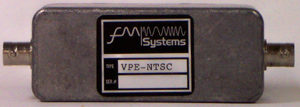NTSC Video Pre/De-Emphasis Response Chart
NTSC VIDEO PRE/DE-EMPHASIS NETWORK LOSS
|
FREQUENCY
|
PRE-EMPHASIS (dB)
|
DE-EMPHASIS (dB)
|
NOTATION
|
|
1.00 KHz
|
-13.3999
|
– 0.0001
|
|
|
10.00 KHz
|
-13.3880
|
– 0.0120
|
|
|
100.00 KHz
|
-12.3650
|
– 1.0350
|
|
|
195.75 KHz
|
-10.4000
|
– 3.0000
|
(3dB INFLECTION POINT)
|
|
404.53 KHz
|
– 6.7000
|
– 6.7000
|
(PRE/DE-EMPH. EQUAL LOSS)
|
|
761.60 KHZ
|
– 3.0000
|
-10.4000
|
(3dB INFLECTION POINT)
|
|
1.00 MHZ
|
– 2.3200
|
-11.0800
|
|
|
2.00 MHz
|
– 0.7200
|
-12.6800
|
|
|
3.00 MHz
|
– 0.3400
|
-13.0600
|
|
|
4.00 MHz
|
– 0.1900
|
-13.2100
|
|
|
5.00 MHz
|
– 0.1200
|
-13.2800
|
|
|
-13.4000
|
(THEORETICAL LIMIT)
|
| 1 + 28.58(F squared) | |
| FORMULA: dB = 10 LOG | ———————————– |
| 1 + 1.306(F squared) |
F = FREQUENCY OF INTEREST
TIME CONSTANT = 0.8162 microseconds
ROOFED LOSS = 13.4 dB
THE PURPOSE OF VIDEO PRE AND DE-EMPHASIS IN TRANSMISSION, WHY IS IT USED?
Video Pre-Emphasis and De-Emphasis is used with Frequency Modulation (FM) transmission systems. It is used to offset the triangular noise distribution created by FM transmission systems. FM Fiber, Satellite and microwave transmission systems exhibit this kind of triangular noise pattern. This noise reduction technique uses “ROOFING” that is the curve of the Emphasis bottoms out, goes to the minimum level and stops changing at predetermined frequencies. The use of Video Pre-Emphasis and De-Emphasis will result in substantial improvement in the received Signal-to-Noise Ratio.

Video Pre-Emphasis for NTSC


